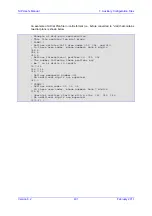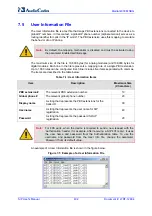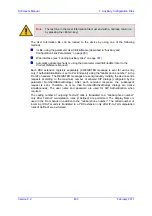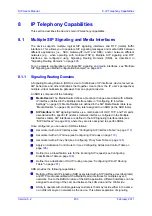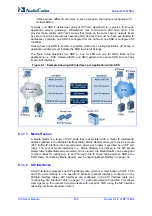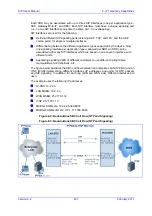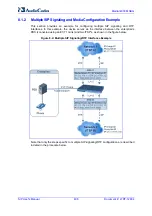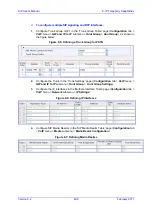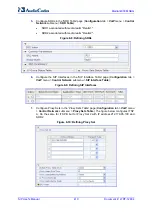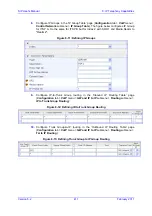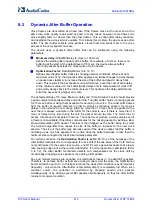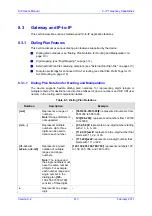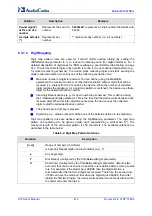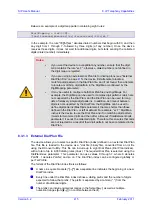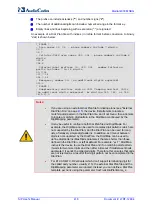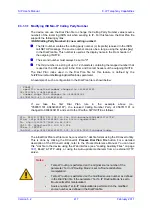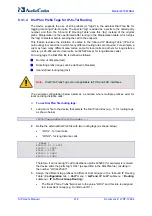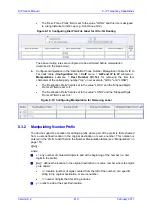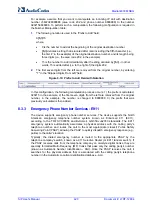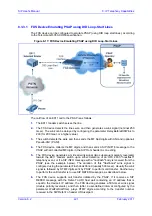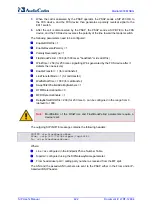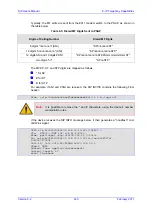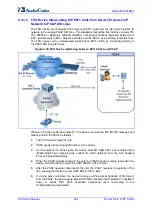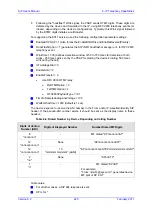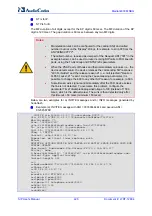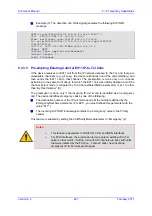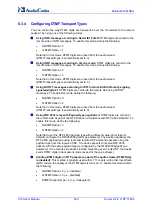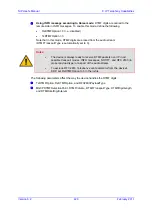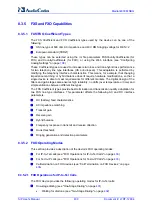
Version 6.2
415
February 2011
SIP User's Manual
8. IP Telephony Capabilities
Below is an example of a digit map pattern containing eight rules:
DigitMapping = 11xS|00
[1-
7]xxx|8xxxxxxx|#xxxxxxx|*xx|91xxxxxxxxxx|9011x|xx.T
In the example, the rule "00
[1-
7]xxx" denotes dialed numbers that begin with 00, and then
any digit from 1 through 7, followed by three digits (of any number). Once the device
receives these digits, it does not wait for additional digits, but starts sending the collected
digits (dialed number) immediately.
Notes:
•
If you want the device to accept/dial any number, ensure that the digit
map contains the rule "xx.T"; otherwise, dialed numbers not defined in
the digit map are rejected.
•
If you are using an external Dial Plan file for dialing plans (see ''External
Dial Plan File'' on page
), the device first attempts to locate a
matching digit pattern in the Dial Plan file, and if not found, then attempts
to locate a matching digit pattern in the Digit Map (configured by the
DigitMapping parameter).
•
It may be useful to configure both Dial Plan file and Digit Maps. For
example, the Digit Map can be used for complex digit patterns (which are
not supported by the Dial Plan) and the Dial Plan can be used for long
lists of relatively simple digit patterns. In addition, as timeout between
digits is not supported by the Dial Plan, the Digit Map can be used to
define digit patterns (MaxDigits parameter) that are shorter than those
defined in the Dial Plan, or left at default. For example, “xx.T” Digit Map
instructs the device to use the Dial Plan and if no matching digit pattern,
it waits for two more digits and then after a timeout (TimeBetweenDigits
parameter), it sends the collected digits. Therefore, this ensures that calls
are not rejected as a result of their digit pattern not been completed in the
Dial Plan.
8.3.1.3 External Dial Plan File
The device allows you to select a specific Dial Plan (index) defined in an external Dial Plan
file. This file is loaded to the device as a *.dat file (binary file), converted from an
ini
file
using the DConvert utility. This file can include up to eight Dial Plans (Dial Plan indices),
with a total of up to 8,000 dialing rules (lines). The required Dial Plan is selected using the
DialPlanIndex parameter. This parameter can use values 0 through 7, where 0 denotes
PLAN1, 1 denotes PLAN2, and so on. The Dial Plan index can be configured globally or
per Tel Profile.
The format of the Dial Plan index file is as follows:
A name in square brackets ("
[...]") on
a separate line indicates the beginning of a new
Dial Plan index.
Every line under the Dial Plan index defines a dialing prefix and the number of digits
expected to follow that prefix. The prefix is separated by a comma (",") from the
number of additional digits.
The prefix can include numerical ranges in the format
[x-
y], as well as multiple
numerical ranges
[n-
m]
[x-
y] (no comma between them).
Summary of Contents for Mediant 800 MSBG
Page 2: ......
Page 366: ...SIP User s Manual 366 Document LTRT 12804 Mediant 800 MSBG Reader s Notes ...
Page 372: ...SIP User s Manual 372 Document LTRT 12804 Mediant 800 MSBG Reader s Notes ...
Page 390: ...SIP User s Manual 390 Document LTRT 12804 Mediant 800 MSBG Reader s Notes ...
Page 404: ...SIP User s Manual 404 Document LTRT 12804 Mediant 800 MSBG Reader s Notes ...
Page 616: ...SIP User s Manual 616 Document LTRT 12804 Mediant 800 MSBG Reader s Notes ...
Page 636: ...SIP User s Manual 636 Document LTRT 12804 Mediant 800 MSBG Reader s Notes ...
Page 652: ...SIP User s Manual 652 Document LTRT 12804 Mediant 800 MSBG Reader s Notes ...
Page 886: ...SIP User s Manual 886 Document LTRT 12804 Mediant 800 MSBG Reader s Notes ...

